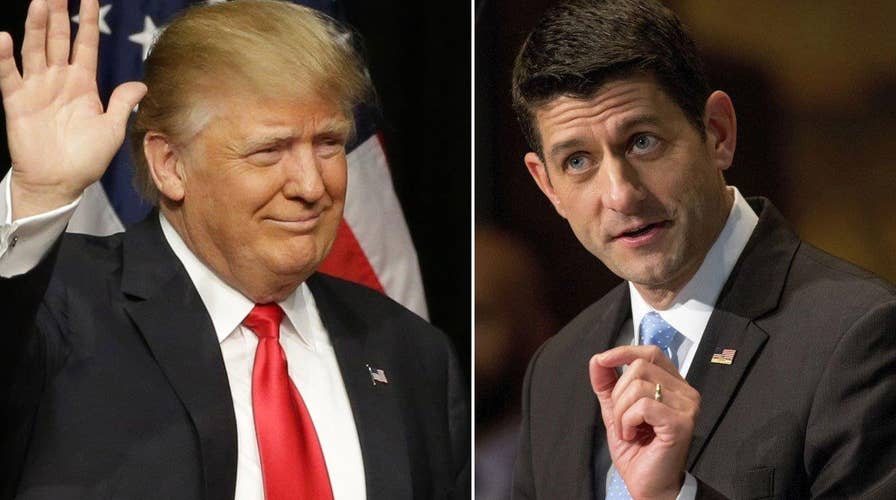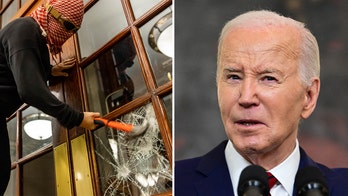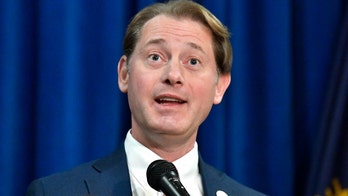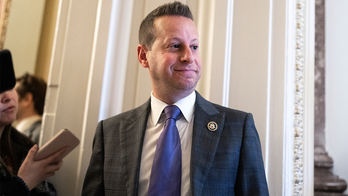Trump endorses Paul Ryan, John McCain and Kelly Ayotte
Reaction on 'Hannity' after the Republican nominee throws his support behind prominent Republicans up for reelection
This is a really long congressional recess.
Which begs the question, what would things be like had Congress been in session as Donald Trump’s presidential campaign stumbled and infuriated Republicans who grudgingly support their nominee?
The House and Senate abandoned Washington in mid-July to accommodate the Republican and Democratic political conventions. Then, Congress took off for the entire month of August and even a week into September. Congress frequently ditches Washington for four to five weeks in August and September for the annual summer break. But this respite stretches seven weeks, one of the longest congressional vacations in more than half a century.
The theory is that it’s better to have lawmakers back in their districts during an election year. But one wonders if it may have been better for GOP members of Congress to be on Capitol Hill to help mitigate some of the Trump fallout. Or, could hanging around Washington have exacerbated things for Republicans?
Democrats have skin in the game on this, too.
Imagine Congress conducting sessions during all of the Trump hullabaloo. You think House Speaker Paul Ryan, R-Wis., and Senate Majority Leader Mitch McConnell, R-Ky., are in a tough spot now? Imagine reporters haranguing them in the hall and at every press conference about why they still support Trump after whatever questionable statement. Perhaps the media pressure would actually compel either leader, to say nothing of other Republicans, to disavow the GOP standard-bearer.
Don’t forget about Trump’s tweet in appreciation of Ryan’s primary opponent Paul Nehlen. Trump also waffled on endorsing Sens. John McCain, R-Ariz., and Kelly Ayotte, R-N.H., in their reelection bids – before finally throwing support behind both incumbents. The failure-to-endorse maneuver just days prior to the primary would have surely ignited a press firestorm if Congress had been in session – until Trump reversed course.
There may be no upside in this for rank-and-file Republicans. Weekly huddles of the House’s pro-Trump caucus at the Capitol Hill Club -- frequently led by Trump’s then-top adviser Paul Manafort – would emerge as “must cover” events for reporters. These confabs usually drew a handful of scribes before. But story-hungry reporters would flood the sidewalk for these sessions, ready to pepper Manafort with questions or pry answers or defenses out of Trump loyalists. Consider the pursuit of Manafort about his ties to Kiev or Moscow. So far, some of Trump’s most-ardent supporters have stood foursquare behind the nominee. But reporters would surely pose tough questions to Trump defenders like Reps. Chris Collins, R-N.Y., Tom Marino, R-Pa., and Lou Barletta, R-Pa.
If nothing else, the hacks of the Democratic National Committee (DNC) and Democratic Congressional Campaign Committee (DCCC) may have distracted from some of Trump’s foibles, forcing reporters to chase the likes of ousted DNC Chairwoman Rep. Debbie Wasserman Schultz, D-Fla., and DCCC Chairman Rep. Ben Ray Lujan, D-N.M. Those stories may have given the GOP some breathing room on Trump as reporters dug more deeply into efforts by Wasserman Schultz (revealed in the hacked messages) to tilt the primary playing field in favor of Hillary Clinton and against Sen. Bernie Sanders, I-Vt.
Congressional Republicans could have chewed up some legislative time with efforts to make light of Clinton’s comments on Fox News about her private email server and whether or not the feds should investigate her for lying to Congress during her hearing last fall before the House Benghazi Committee. That may still come. But not until September.
Still, congressional action cuts two ways.
House Republicans plowed through a number of annual spending bills in the spring and early summer. But if Congress were still in session, it’s likely Democrats might try various tactics to force the House and Senate to okay plans to ban flying the Confederate flag at federal facilities or barring LGBTQ discrimination in federal contracting. Such tactics forced the defeat of one appropriations bill earlier this year. Republicans appeared to have quashed future Democratic efforts on these scores. But one never knows what gambits Democrats could have up their sleeves. Moreover, it’s not clear the House could even advance all of these appropriations measures.
Just before the break, a coalition of conservative lawmakers and members of the House Freedom Caucus filed a resolution to force a vote to impeach IRS Commissioner John Koskinen. The House Republican leadership has been cool to such a move, considering the fact that Congress hasn’t voted to impeach any cabinet official since the late 19th Century. Never mind that the IRS commissioner is a far cry from having a seat at the president’s cabinet table. Congressional rules would have triggered a near-immediate vote on the resolution had the House been in session. Or, the House Republican leadership would have found itself crossways with conservatives had it moved to euthanize the measure. Not an easy choice. Such an internal battle would probably refocus attention on internal GOP battles and take some pressure off of Trump. But by the same token, Republicans may have drawn attention to their own divisions and not directed maximum fire on Hillary Clinton.
Perhaps that’s the greatest deficiency for Republicans when Congress isn’t in session for such a protracted period: not a lot of noise about Clinton.
The national press appears fixated on Trump. But various GOP congressional hearings and news conferences looking at Clinton – or even problems Republicans perceive with the Obama administration – can indirectly mitigate some of that message.
Nothing can exist in a vacuum. Undoubtedly, a congressional session would have contoured the political debate. But it’s unclear what time in Washington would have meant for either party.
Capitol Attitude is a weekly column written by members of the Fox News Capitol Hill team. Their articles take you inside the halls of Congress, and cover the spectrum of policy issues being introduced, debated and voted on there.





